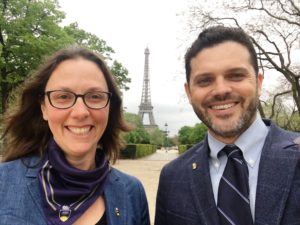
Today in Paris, Flinders will become only the second university in the world to chair a UNESCO UNITWIN Network for Underwater Archaeology Meeting, cementing the University’s position at the epicenter of international underwater archaeology.
Dr Jonathan Benjamin, Dr Wendy Van Duivenvoorde, Dr Paul Baggaley and newly recruited PhD student John McCarthy will have the honour of representing Flinders at UNESCO HQ for the incredibly rare opportunity.
The honour comes as Flinders enjoys the biggest expansion in Maritime Archaeology in the program’s history.
Created in response to the belief that, after two world wars in less than a generation, peace must be established on the basis of humanity’s moral and intellectual solidarity, UNESCO is a global player in driving education for all, intercultural understanding, scientific cooperation and freedom of expression.
Associate Professor Mark Staniforth, who founded Flinders’ Maritime Archaeology program, said chairing the Paris meeting was one of the most significant achievements for a rapidly expanding program that this year would recruit its largest cohort of PhDs yet.
“The UNITWIN Maritime and Underwater Archaeology Network was established by UNESCO to promote international inter-university co-operation. It is, therefore, the most important international forum for networking and collaboration between all of the University Maritime and Underwater Archaeology programs in the world,” he said.
“That Flinders University should be only the second university globally to be appointed as the Chair of this important network is a testament to how far the Maritime Archaeology Program (MAP) has come since its establishment in 2002
“This important meeting this week at UNESCO headquarters in Paris, France, will further enhance MAP’s growing international reputation.”
Dr Benjamin said it was a great honour to represent Flinders and Australia at the UNESCO summit, at which he planned to showcase the incredible work being done by South Australian researchers.
“Maritime and underwater archaeology as a distinct sub-discipline requires not only specialist knowledge and equipment, but collegial support and partnership at home and abroad,” he said.
“We are fortunate to have Australia’s leading program in Maritime Archaeology and great support from our University and Faculty who not only appreciate the added costs, but understand the added value of diving and boat-based research.
“We’re in a great position and our growth over the past decade is visible internationally. We have the largest intake of new PhD candidates ever and chairing the UNITWIN meeting in Paris at the UNESCO Headquarters is a demonstration of just how far we’ve come.
“It’s been a real team effort.”
Finders researchers have already attracted international media coverage of their work, including a BBC report this week on a partnership with Scottish archaeologists to document more than 100 shipwrecks and maritime artefacts of Scotland’s west coast.
These include two lost World War Two flying boats and anchors from 18th Century ships.
http://www.bbc.com/news/uk-scotland-highlands-islands-36148771

